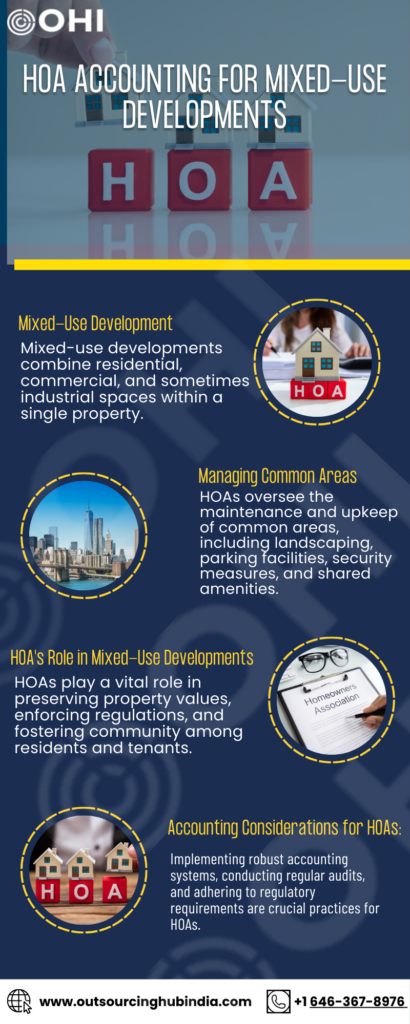
Introduction:
Mixed-use developments have become increasingly popular in urban areas, combining residential and commercial spaces within a single property. With this unique blend of uses comes the need for specialized accounting practices to manage the financial aspects of both residential and commercial components. In this article, we will explore the intricacies of HOA accounting for mixed-use developments, focusing on how to effectively manage residential and commercial spaces to ensure financial transparency, stability, and success.
In these mixed-use developments, the homeowners’ association (HOA) plays a crucial role in overseeing the common areas, amenities, and services that serve both residential and commercial occupants. The accounting practices employed by HOAs must account for the diverse needs and obligations of both residential and commercial stakeholders, requiring a comprehensive understanding of the unique challenges and opportunities presented by mixed-use properties.
Understanding Mixed-Use Developments:
- Definition: Mixed-use developments combine residential, commercial, and sometimes industrial spaces within a single property or complex.
- Popularity: These developments are increasingly popular in urban areas due to their ability to create vibrant, walkable communities with diverse amenities.
- Types: They can take various forms, including vertical buildings with retail on the ground floor and apartments above, or horizontal neighborhoods with a mix of residential, commercial, and recreational spaces.
The Role of HOAs in Mixed-Use Developments:
- Responsibilities: HOAs are responsible for managing common areas, amenities, and services that serve both residential and commercial occupants.
- Preserving Values: They play a crucial role in preserving property values by enforcing rules and regulations, maintaining common areas, and fostering a sense of community.
- Challenges: Balancing the needs of residential and commercial stakeholders can pose challenges, requiring careful management and communication.
Accounting Considerations for HOAs:
- Unique Challenges: HOAs face unique accounting challenges in mixed-use developments, such as tracking revenue from different sources and managing expenses for shared facilities.
- Financial Management: Accurate financial reporting, budgeting, and reserve fund management are essential for maintaining the financial health of HOAs.
- Best Practices: Implementing robust accounting systems, conducting regular audits, and adhering to regulatory requirements are key best practices for HOA accounting.

Managing Residential and Commercial Spaces:
- Maintenance Responsibilities: HOAs are responsible for maintaining common areas, landscaping, parking facilities, and other shared amenities.
- Balancing Needs: Strategies for balancing the needs of residential and commercial tenants include allocating expenses fairly and addressing conflicting priorities.
- Communication and Collaboration: Effective communication and collaboration among HOA board members, property managers, residents, and commercial tenants are crucial for managing mixed-use spaces effectively.
Financial Controls and Transparency:
- Financial Controls: Strong financial controls are necessary to prevent fraud, ensure compliance with regulations, and maintain accountability.
- Transparency: Transparency in financial reporting, including publishing financial reports and conducting regular meetings, helps build trust and confidence among stakeholders.
- Improving Transparency: Tips for improving transparency include soliciting feedback from residents and commercial tenants, maintaining clear communication channels, and using technology to streamline financial processes.
Future Trends and Opportunities:
- Emerging Trends: Emerging trends in mixed-use development include incorporating sustainable design principles, integrating technology solutions, and promoting community engagement.
- Opportunities for HOAs: Opportunities for HOAs in mixed-use developments include generating additional revenue streams through mixed-use zoning, leasing commercial spaces, and implementing innovative amenities.
- Adapting to Change: Adapting to changing market conditions, regulatory requirements, and demographic shifts is essential for the long-term success of mixed-use developments and HOAs.
Technology Integration:
- Automation: Implementing technology solutions like property management software can streamline operations, automate repetitive tasks, and improve efficiency.
- Data Analytics: Leveraging data analytics tools allows HOAs to gain insights into trends, track performance metrics, and make data-driven decisions.
- Communication Platforms: Using communication platforms like community portals or mobile apps facilitates better communication between residents, property managers, and HOA boards.
Legal and Regulatory Compliance:
- Understanding Regulations: Staying informed about local zoning laws, building codes, and HOA regulations is essential for compliance.
- Risk Management: HOAs should assess potential legal risks, such as liability issues or disputes, and implement strategies to mitigate them.
- Professional Advice: Seeking legal counsel or consulting with regulatory experts can provide valuable guidance on compliance matters.
Community Engagement:
- Events and Activities: Organizing community events, social gatherings, and recreational activities fosters a sense of belonging and strengthens community bonds.
- Feedback Mechanisms: Establishing channels for resident feedback and involvement in decision-making processes promotes transparency and inclusivity.
- Volunteer Opportunities: Encouraging resident participation in committees or volunteer groups empowers them to contribute to the community’s well-being.
Sustainability Initiatives:
- Energy Efficiency: Implementing energy-efficient practices, such as LED lighting or smart thermostats, reduces utility costs and environmental impact.
- Waste Management: Introducing recycling programs or composting initiatives helps minimize waste and promote environmental stewardship.
- Green Spaces: Enhancing green spaces, planting native vegetation, and creating community gardens contribute to a healthier, more sustainable living environment.
Conclusion
In conclusion, effective HOA accounting for mixed-use developments is essential for ensuring financial transparency, stability, and success. By addressing the dual nature of expenses, segregating funds, and implementing transparent reporting practices, HOAs can navigate the complexities of managing both residential and commercial spaces within the same property. Through strategic budgeting, reserve planning, and compliance with legal and regulatory requirements, HOAs can foster a thriving community environment that meets the diverse needs of residents and tenants alike.
Ultimately, by embracing the challenges and opportunities presented by mixed-use developments, HOAs can create a harmonious balance between residential and commercial components. With careful financial management and a commitment to accountability, mixed-use developments can achieve long-term financial sustainability and enhance the quality of life for all stakeholders involved.





